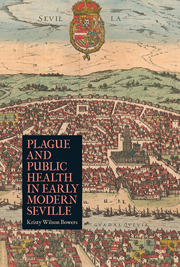Book contents
- Frontmatter
- Dedication
- Contents
- Acknowledgments
- Introduction
- 1 Early Modern Seville: Balancing Growth and Governance
- 2 Perceptions of Plague: Balancing Disease Concepts
- 3 Negotiating Public Health: Balancing the Individual and the Community
- 4 The Wider Politics of Public Health: Balancing Urban and Rural
- 5 City and Crown: Balancing Authorities
- Conclusion
- Notes
- Bibliography
- Index
5 - City and Crown: Balancing Authorities
Published online by Cambridge University Press: 05 October 2013
- Frontmatter
- Dedication
- Contents
- Acknowledgments
- Introduction
- 1 Early Modern Seville: Balancing Growth and Governance
- 2 Perceptions of Plague: Balancing Disease Concepts
- 3 Negotiating Public Health: Balancing the Individual and the Community
- 4 The Wider Politics of Public Health: Balancing Urban and Rural
- 5 City and Crown: Balancing Authorities
- Conclusion
- Notes
- Bibliography
- Index
Summary
In June 1581, King Philip II received a lengthy complaint about mismanagement of a public health crisis in Seville during an ongoing epidemic. This was the epidemic that later chroniclers attributed to catarrh (catarro), which spread virulently beginning in 1580 and was still prevalent the next year. This complaint, however, talks not only of a vague contagion, but specifically refers to plague (mal de peste) and the dangers of its spread. The complaint began by acknowledging the good intentions of the royally appointed Asistente, but castigated all other municipal officials as neglectful. In particular, it specifically charged the Alguacil mayor (public safety official) and his assistant with neglect and absenteeism that had enabled a recent crime wave, including thieves breaking into houses and an unusual number of deaths (the causes of which were not specified). The city councilmen, both Veintiquatros and Jurados, stood accused of neglecting their duties as well, leaving residents to suffer the “downfall and ruin” of the city (ruyna y perdicion de este lugar), including a lack of sanitation that had led to dangerous levels of filth clogging the streets. Continuing the list of complaints, the letter asserted an overall neglect of the city that meant houses were not properly closed after a diagnosis of plague, the sick who had been removed outside city walls were allowed back in too easily, and families were illegally unloading bedding or clothing from the sick by dumping them in the plazas by night, to be taken by poor beggars unaware they could die from the disease transmitted by these items.
- Type
- Chapter
- Information
- Plague and Public Health in Early Modern Seville , pp. 89 - 99Publisher: Boydell & BrewerPrint publication year: 2013



